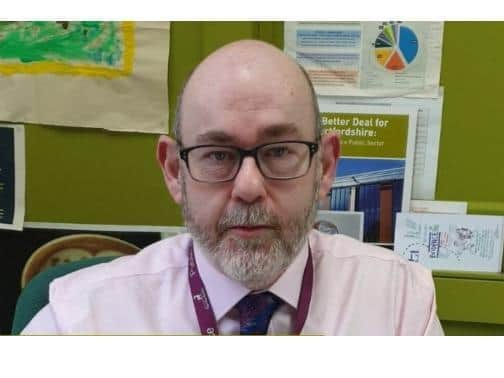‘Don’t place hopes on herd immunity or vaccine soon,’ says Hertfordshire's health chief
and live on Freeview channel 276
Residents should not pin their hopes on a vaccine or ‘herd immunity’ to protect against Covid-19, Hertfordshire’s director of public health Jim McManus has warned.
But they should continue to focus on measures such as hand hygiene, social distancing, face masks and, for those with symptoms, self-isolation.
Advertisement
Hide AdAdvertisement
Hide AdMr McManus made the remarks when addressing a meeting of the county’s Health Scrutiny Committee on Wednesday, September 30.


Outlining the current situation, he pointed to increases in Covid-19 cases in London, Luton and Bedford ‘going up considerably’.
But he said Hertfordshire was “an island of medium transmission – rising and falling in a sea that’s becoming increasingly high”.
He highlighted three large outbreaks in the county, which – he said – have been managed down, while noting that other areas that are going up.
Advertisement
Hide AdAdvertisement
Hide AdAnd he said the current strategy would work provided transmission in neighbouring areas was not uncontrollable and that they could continue to and keep nipping outbreaks ‘in the bud’.
But he cautioned against individuals placing hopes on the development of so-called ‘herd immunity’ or on a vaccine soon.
Herd immunity requires at least 65 per cent of the population having been affected by the virus. The proportion estimated to have been affected in Hertfordshire is estimated to be between 10 and 11.5 per cent.
“I don’t see any prospect of widespread population immunity before next year,” said Mr McManus.
Advertisement
Hide AdAdvertisement
Hide Ad“a. because numbers infected aren’t enough; b. because we don’t yet have a vaccine and c. because actually this idea we should let it rip through the community is not a viable strategy.”
Speaking out against the idea of letting the virus ‘rip’ through the population, Mr McManus said infection in groups of young people would sooner or later transmit to older and vulnerable people.
And he highlighted the 10 to 20 per cent of the population – of all ages – who don’t make antibodies
“. . . so simply letting it rip through is not a good strategy in terms of the numbers of people who would become ill for the long term and the numbers of people who die,” he said.
Advertisement
Hide AdAdvertisement
Hide AdIn addition Mr McManus stressed that “death is not the only bad outcome from Covid” – pointing to people with ‘very long-term symptoms and problems’ from Covid including heart muscle weakening.
And he said: “The strategy still has to be – suppress the virus as much as possible until such time as its impossible to do that and we mitigate – and don’t place hopes on herd immunity or a vaccine soon.
“It’s the good old-fashioned measures that we have been plugging all along and have been very clear about communicating locally – which is hand hygiene, self isolate if you have got symptoms, wear a face covering when you have to and social distancing and cleaning.”
Mr McManus acknowledged national issues around testing capacity, and he highlighted additional testing for key workers in the county, as well as the high completion rates of local contact tracing.
He said local contact tracing had highlighted a possible outbreak linked to a particular Hertfordshire commuter line – with local action being implemented to counter it.